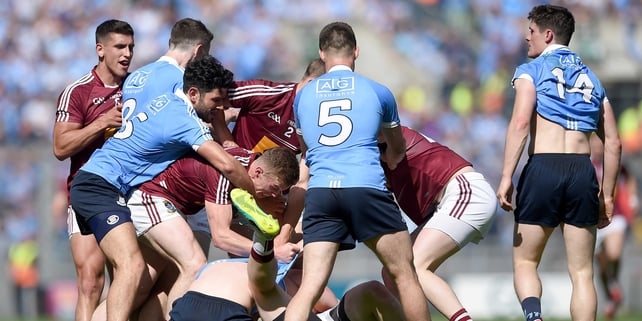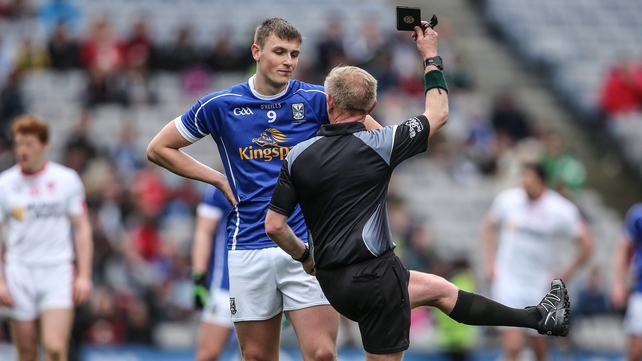Eugene McGee has defended the use of the black card in Gaelic football following a number of controversial decisions at the weekend.
Tyrone players Mattie Donnelly and Cathal McShane were both sent to the line in the Ulster final win over Donegal, for a bodycheck and trip respectively, but the intent of Donnelly, in particular, seemed debatable.
Dublin forward Diarmuid Connolly was shown a yellow card rather than a black in the Leinster decider despite clearly dragging Westmeath's James Dolan to the ground
Former Kerry star Tomas Ó Sé told The Sunday Game that the GAA should "get rid of the black card, it's a joke at this stage" and declared: "Surely to God at this stage we all realise it's not working."
However, McGee, who chaired the Football Review Committee that championed the introduction of the black card to combat cynical play in 2014, told RTÉ Sport that Ó Sé's attitude was typical of a former back and that the rule had had a positive impact on the game.
Never a black card #justsaying
— Cathal Mcshane (@CathalMcshane) July 17, 2016
That was a ridiculous decision to black card Mattie Donnelly. How was he ever going to get out of the way. #Ulster2016
— Steven McDonnell (@Killeavy13) July 17, 2016
2016 Champ is averaging 33.9 points per game. 2nd highest scoring average ever. #gaa
— Rob Carroll (@gaelicstats) July 17, 2016
Just bring in sin bin lads There should be a sin bin in every sport Cuts out cynical fouls and speed up the game! #sundaygame @TheSundayGame
— Nev O'Donoghue (@Nev307) July 17, 2016
"Defenders did the cynical stuff, most defenders want to get rid of it and will attack the black card," said the former All-Ireland-winning manager.
"The black card was brought in to stop cynical play like players being dragged down when they were about to score and other things like mouthing at other players and officials.
"The third-man tackle has been largely eliminated and games are now higher-scoring."
McGee suggested that a lot of the opposition to the black card is due to its relative novelty and the fact that it forced teams to change their ways.
"It's a new rule," he said. "People will complain any time there is a tight decision.
"It's up to management and the players to stop committing the fouls. A lot of the managers didn't want it because they had to discipline their players."

McGee admitted that the requirement for a referee to determine whether certain fouls are 'deliberate' can make some decisions "very hard" but said that most rules depend on the referee using their judgement.
"It was debatable whether Donnelly meant it but the referee was on the spot and he said it was a third-man tackle.
"If there are any flaws in the black card, it's the same flaw that we have in many other situations. It's up to the referee's interpretation.
"Referees also make strange decisions when awarding penalties for example. Some referees don't penalise picking the ball off the ground, even though that rule is 120 years old.
"Human nature is the problem, it's not just the arrival of the black card."
McGee suggested that employing "10 or 12" full-time professional referees could be one way to ensure consistency of decisions and said that "referees using a yellow card instead of a black card as a cop-out" was his biggest complaint about the enforcement of the rules.

Former All-Ireland final referee John Bannon pointed out that referees were making decisions without the benefit of slow-motion replays but also said that he didn't favour the introduction of a TMO
"The black card can be difficult to implement because it uses the word deliberate, so it means the referee has to make up his mind whether the player is making a deliberate foul," he told RTÉ Sport.
"From his years of refereeing both club games and inter-county games, he makes a judgement call on the spur of the moment.
"We've had lots of incidents in the last few weeks, where we've had different camera angles and people are still unclear as to what the decisions should be. The referee has to make the decision there and then."
"In Gaelic games, with the speed of the game, having to go to a TMO and stop the play wouldn't help."
The black card came into effect in January 2014 following a 70% vote in favour of the measure at the previous year's GAA congress.
Players deemed to have committed 'cynical behaviour fouls' must leave the pitch and can be replaced by a substitute as long as they have not already been shown a yellow card or the team has used all their substitutes/already made three subs for black-card offences.
Black-card offences
- Deliberately pull down an opponent.
- Deliberately trip an opponent with the hand(s), arm, leg or foot.
- Deliberately body collide with an opponent after he has played the ball away or for the purpose of taking him out of a movement of play.
- Threaten or to use abusive or provocative language or gestures to an opponent or a teammate.
- Remonstrate in an aggressive manner with a match official.
We need your consent to load this SoundCloud contentWe use SoundCloud to manage extra content that can set cookies on your device and collect data about your activity. Please review their details and accept them to load the content.Manage Preferences

